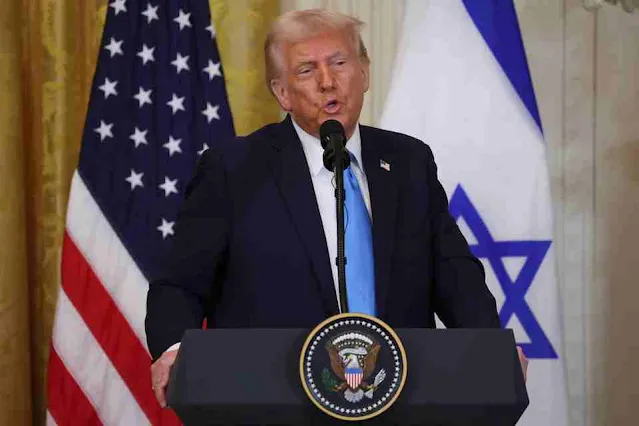Trump signals openness to negotiations with Iran
Donald Trump expresses willingness for a new agreement with Iran but insists Tehran must abandon nuclear ambitions.
By Widya Putri and Clarisa Sendy
U.S. President Donald Trump stated on Tuesday that he is open to striking a deal with Iran to improve bilateral relations but firmly warned that Tehran must not develop nuclear weapons. Speaking to reporters in Washington, Trump emphasized that while he is willing to negotiate, nuclear proliferation remains a non-negotiable issue.
"I say this to Iran, who’s listening very intently, ‘I would love to be able to make a great deal. A deal where you can get on with your lives,’" Trump said.
However, he made it clear that any agreement must prevent Iran from developing nuclear capabilities. "They cannot have one thing. They cannot have a nuclear weapon, and if I think that they will have a nuclear weapon... I think that’s going to be very unfortunate for them," he added.
Trump’s remarks come amid ongoing tensions between Washington and Tehran, with the U.S. imposing strict sanctions on Iran and withdrawing from the 2015 nuclear deal. While Iran has indicated its willingness to return to negotiations under certain conditions, its nuclear program remains a major point of contention.
Background on U.S.-Iran tensions
Tensions between the United States and Iran have been escalating since 2018 when Trump withdrew from the Joint Comprehensive Plan of Action (JCPOA), commonly known as the Iran nuclear deal. The agreement, brokered under former President Barack Obama, placed strict limits on Iran’s nuclear program in exchange for sanctions relief.
Following the U.S. withdrawal, Trump reimposed severe economic sanctions on Iran, targeting its oil exports and banking sector. The move was intended to pressure Tehran into renegotiating a broader agreement that would address not only its nuclear activities but also its ballistic missile program and regional influence in the Middle East.
In response, Iran began scaling back its compliance with the JCPOA, enriching uranium beyond agreed-upon limits and restricting access to international inspectors. These actions have raised alarms among world powers and heightened concerns about a potential military confrontation.
Trump’s mixed signals on Iran policy
Trump’s latest comments reflect his often-contradictory approach to Iran. While he has expressed openness to diplomatic talks, his administration has pursued a “maximum pressure” strategy, imposing heavy sanctions and increasing military deployments in the region.
At times, Trump has hinted at direct engagement with Iranian leadership. In 2019, he stated that he was willing to meet with Iranian President Hassan Rouhani without preconditions. However, such talks never materialized, and relations remained strained.
Trump has also warned Iran against military provocations, stating that any attack on U.S. interests would be met with severe consequences. His administration has authorized drone strikes on Iranian military leaders, including the assassination of General Qassem Soleimani in January 2020, which further escalated hostilities.
Despite these actions, Trump has maintained that he does not seek war with Iran. Instead, he has framed his policy as an effort to secure a better deal—one that not only curtails Iran’s nuclear ambitions but also addresses its support for proxy militias across the Middle East.
Iran’s response to Trump’s offer
Iranian officials have repeatedly rejected Trump’s calls for renegotiation, arguing that the U.S. violated the original nuclear deal by withdrawing unilaterally. Tehran has insisted that it will only return to full compliance with the JCPOA if Washington lifts sanctions first.
Supreme Leader Ayatollah Ali Khamenei has dismissed Trump’s overtures as insincere, stating that Iran does not trust U.S. promises after the JCPOA’s collapse. Iranian leaders have also pointed to their increased uranium enrichment as leverage in future negotiations.
Foreign Minister Mohammad Javad Zarif has criticized Trump’s approach, calling it economic warfare. “You cannot negotiate while you are pointing a gun at someone’s head,” Zarif said in a previous interview, referring to the U.S. sanctions.
Global reactions to Trump’s remarks
Trump’s comments have drawn mixed reactions from international leaders. European allies, who remain committed to the JCPOA, have called for de-escalation and a return to diplomatic talks. France, Germany, and the United Kingdom have urged both Washington and Tehran to find common ground and prevent further destabilization in the region.
Meanwhile, Israel has strongly supported Trump’s tough stance on Iran, arguing that Tehran’s nuclear ambitions pose a direct threat to its security. Israeli Prime Minister Benjamin Netanyahu has repeatedly called for stronger measures to prevent Iran from acquiring nuclear weapons, praising Trump’s withdrawal from the JCPOA as a necessary step.
Russia and China, both signatories of the original nuclear deal, have urged the U.S. to lift sanctions and re-engage in negotiations, arguing that pressure tactics alone will not resolve the conflict.
What comes next for U.S.-Iran relations?
With tensions still running high, the future of U.S.-Iran relations remains uncertain. Trump’s latest remarks suggest that he is willing to negotiate, but whether Iran will engage on his terms is unclear.
The upcoming U.S. presidential election could also influence the direction of American foreign policy. If Trump secures another term, his administration is likely to continue its maximum pressure campaign. However, if a new administration takes office, there may be renewed efforts to revive diplomatic talks.
For now, Iran continues to expand its nuclear program, bringing it closer to weapons-grade enrichment levels. The international community remains on edge, watching to see whether Trump’s offer will lead to a breakthrough or if tensions will escalate further.
As both sides weigh their next moves, the possibility of a new U.S.-Iran deal remains uncertain, but Trump’s remarks signal that the door to negotiations is not entirely closed.


Post a Comment for "Trump signals openness to negotiations with Iran"